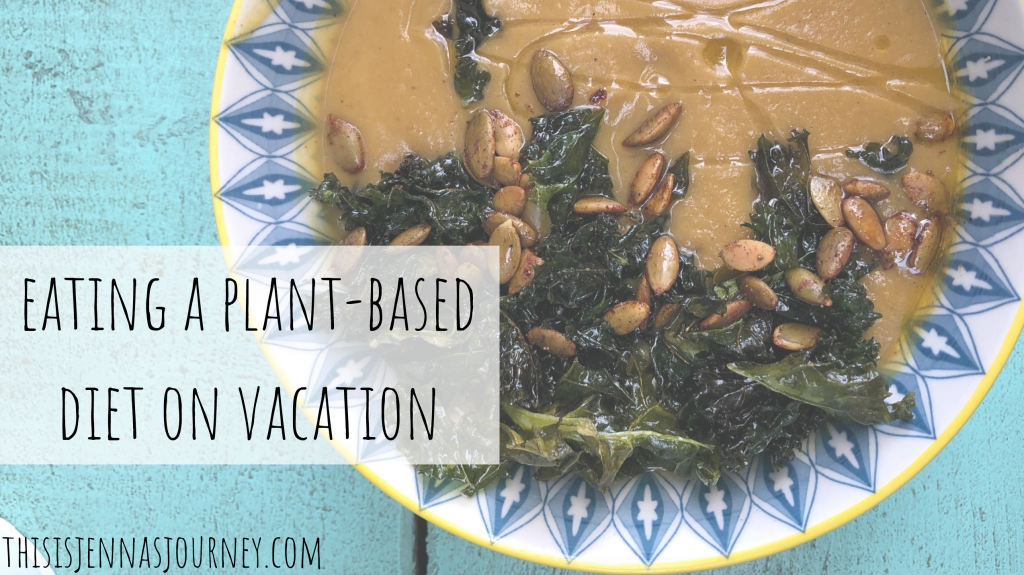Hello, there! Happy Saturday. I just returned from a much-needed vacation in Montreal. In light of this vacation, I was inspired to write a post about eating a plant-based diet on vacation.
As you may recall from past posts, I have been vegetarian for just over two years. I’ve provided many tips on the blog about eating vegetarian/vegan during holidays, my go-to recipes and more, but I haven’t shared my tips for eating plant-based while on vacation yet. This can be challenging if you don’t have a good strategy, so I am here to help you enjoy your travels, eat well and help the planet! I’ll also include some of my favourite eats from my trip to Montreal.
I would say I eat vegan about 50 percent of the day. I really only eat eggs (I swear I am getting more lactose intolerant every day) and occasionally honey; the rest of my diet is plant-based. I love veggies (yes, you may think that’s weird) and as someone who aims to get all of their essential nutrients like vitamins and minerals out of their diet, it is important for me to eat well-balanced, whole foods. Eating a poor diet of plant-based foods can take several forms, including one that is filled with greasy, processed foods like french fries, chips and more.
While good in moderation, this post focuses on helping you eat nutrient-dense, “whole” foods while travelling, such as fruits, veggies, whole grains and nuts/seeds. With the tips I provide below, you’ll never worry about eating a plant-based diet on vacation!
1. Do your research.
One of my favourite things about visiting new places is trying out their restaurants and cafes. Food is central to culture, so eating at local hotspots and trying out traditional delicacies is the best way to learn about the culture. This may seem hard when you’re a vegetarian/vegan and so many foods revolve around meat. However, many restaurants offer veg-friendly options so you can still enjoy the local cuisine. Do some research online to find the local favourites, and check out some menus to see what sort of plant-based options they offer. You can also research what traditional foods are already plant-based. For instance, Montreal bagels are vegan and a must-try.

2. Plan ahead
One of my best recommendations is to plan ahead. As much as we’d like decent vegetarian/vegan options to be widely available, this is unfortunately not always the case. Unless you really enjoy spending 20 dollars on pasta every day, your food options may be limited without proper planning.
The best way to avoid this is to select where you will be going in advance. Most restaurants allow you to make reservations online now, or you could always call to book a table. Do some research online to see what local options are available and what food excites you the most. Find a restaurant that will appease all of your travel mates while suiting for your dietary needs.

3. Pack snacks
Despite research and planning, there will not always be decent options available to you. Maybe the restaurant you want to go to is fully booked, or they changed their menu around, or you are on a road trip and you can’t plan where you will be stopping. In those cases it’s a good idea to have snacks packed so that you always have something to eat on hand.
Packing snacks is easy and way more affordable than buying overpriced snacks at every gas station you stop at (which may not even have good veg options). It also ensures you always have something you enjoy on hand. Some of my favourite snacks to pack include fresh fruits, homemade trail mix, cookies, crackers with hummus, boiled eggs and granola bars.

4. Ask for accommodations
Sometimes restaurants are willing to make accommodations that are not listed on their menus. For instance, you could take the meat out of a sandwich, add extra veggies, etc. The only way you’ll know if they offer this is to ask! It can be intimidating sometimes to ask the waiter while your table is ordering, but if it means you will enjoy a good meal, then don’t worry about asking. The more people who ask for change, the more options that will be available in the future at the restaurant as the demand for plant-based options increase.

These four tips have been life-savers during my travels and make it easy to adhere to my dietary choices. When I don’t worry about food, rather I get excited about what is out there for me to try. Not only can I still engage in the local cuisine, but I can do so in a way that helps the environment…and my wallet, since plant-based foods are usually cheaper on menus!
With these tips you will not have to worry about eating a plant-based diet on vacation. If you are a vegetarian/vegan, what do you find the most challenging part about eating on vacation? How do you make sure you eat well while on vacation? If you are an omnivore, have you ever considered the options available to plant-based eaters? Let me know in the comments!
For more tips on eating a plant-based diet, check out these posts:
- 10 best plant-based restaurants in Toronto
- What’s the deal with almond milk?
- Plant-based recipe roundup
- Plant-based during the holidays
Until next time!

